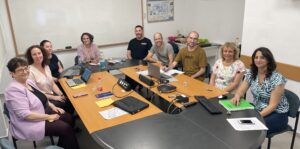Background

Prof. Yehudit Judy Dori has been intermittently visiting professor and visiting scholar at Massachusetts Institute of Technology (MIT), Cambridge, MA, since 2000. Between 2009 and 2013 she was Dean of Continuing Education and External Studies at the Technion. In 2013-2014 she was Visiting Professor at Electrical Engineering and Computer Science and in 2014-2015 she was Visiting Scientist at the Computer Science and Artificial Intelligence Laboratory, both at MIT.
Her research interests encompass learning in technology-rich environments, educational assessment, scientific visualizations, and metacognition at high school and university levels.
Prof. Dori is member of the editorial board of Journal of Science Education and Technology (JOST) and was twice member of the editorial board of Journal of Research in Science Teaching (JRST).
She served on the NARST International committee and the NARST Membership and Elections committee. She was Guest Editor of two special issues on the educational reform at MIT in the Journal of Science Education and Technology (2007, 2008).
Her book on metacognition in science education, which Prof. Dori co-edited with Prof. Zohar, was published by Springer in 2012, and she is the first editor of a second edited book on Cognition, Metacognition, and Culture in STEM Education, published by Springer in 2018.
Goals
- AfL
Advocating for better assessment for learning (AfL) practices throughout the education system.
-
Teachers’ knowledge
Understanding teachers’ professional development through the development of teachers’ knowledge and skills.
- SRL and AfL
Self-regulated learning (SRL) and assessment for learning are closely related, as both involve individuals taking an active role in their own learning and evaluating their own progress. In the case of SRL, individuals set learning goals, monitor their progress, and make adjustments as needed in order to improve their performance. In the case of assessment for learning, teachers use a variety of techniques to gather information about students’ understanding and progress, and to tailor their instruction to better meet students’ needs.
-
SRL and SRL&T
Promoting teachers’ ability to cultivate self-regulated learning (SRL) in their students, whilst promoting their own self-regulated teaching and learning (SRL&T).
- Reflection and SRL
Reflection is an important part of both SRL and assessment for learning. In the case of SRL, reflection allows individuals to gain a better understanding of their own learning processes and to make changes that will help them learn more effectively. In the case of assessment for learning, reflection allows teachers to analyze the effectiveness of their instruction and to make changes as needed to better support student learning.
- Modeling and Systems Thinking
Modeling and systems thinking are both tools used to better understand complex systems. Modeling is the process of creating a simplified representation of a system, while systems thinking is the process of understanding how the elements of a system interact and affect each other. Modeling involves breaking down a system into its individual components and then creating a representation that allows analysis and interpretation of its behavior. Systems thinking involves looking at the complex interactions between the components to better understand the system as a whole. Both modeling and systems thinking can be used to identify patterns, predict outcomes, and identify areas for improvement
